RESOURCE TYPE
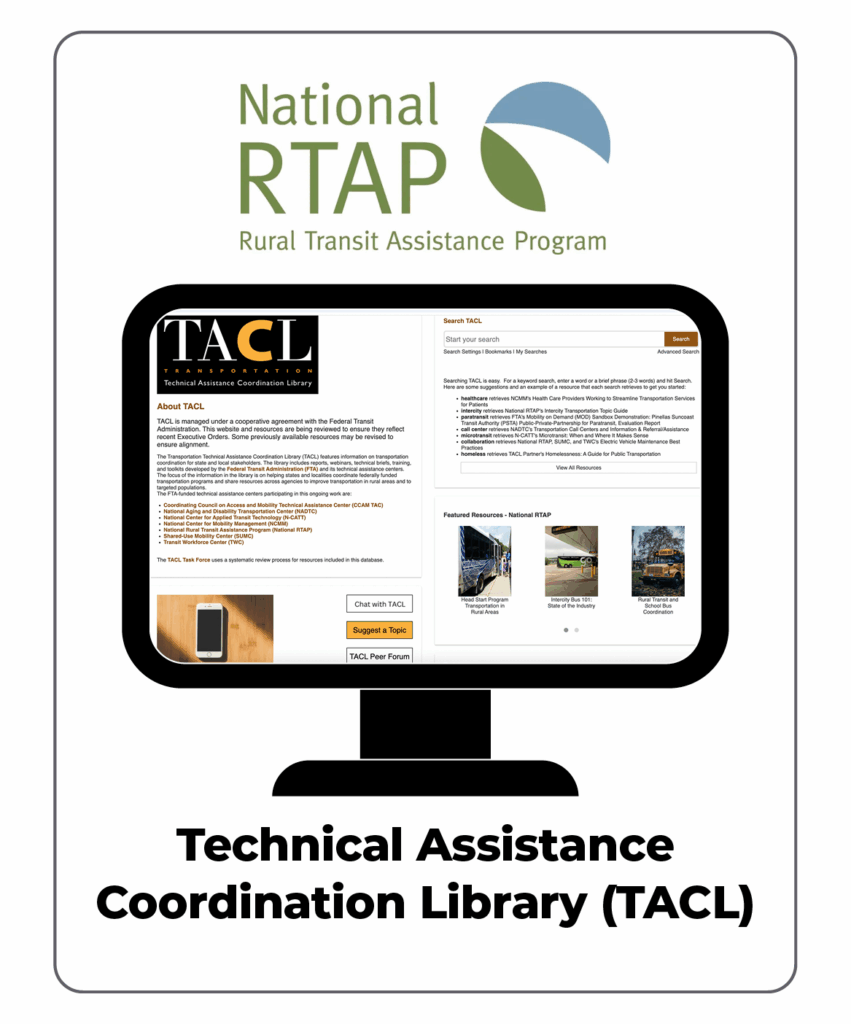
Technical Assistance Coordination Library (TACL)
National Rural Transit Assistance Program
TOPICS: Apprenticeship , Career Pathways , Community Engagement , Hiring and Recruitment , Labor-Management Partnerships , Low-No , Mentorship , Policy and Planning , Procurement , Program Evaluation and ROI , Retention , Safety and Health , Trainer and Mentor Development , Training , Workforce Shortage
Transportation Technical Assistance Coordination Library (TACL)
The Transportation Technical Assistance Coordination Library (TACL) provides a viable methodology and platform for access and findability of rural and tribal transit coordination resources across a broad range of transportation technical assistance centers and the Federal Transit Administration (FTA).
The FTA-funded Technical Assistance (TA) Centers participating in this ongoing work are:
- National Aging and Disability Transportation Center (NADTC)
- National Center for Applied Transit Technology (N-CATT)
- National Center for Mobility Management (NCMM)
- National Rural Transit Assistance Program (National RTAP)
- Shared Use Mobility Center (SUMC)
- Transit Workforce Center (TWC)
The TACL Task Force uses a systematic review process for resources included in the database. New resources will be added on a quarterly basis. Let us know if you would like to serve as a peer reviewer for our resources.
Why was TACL created?
The United States Government Accountability Office (GAO) published Public Transportation: Enhanced Federal Information Sharing on Coordination Could Improve Rural Transit Services in January 2020. GAO recommended that FTA “develop a communication plan that will effectively share information with state and local stakeholders on coordination opportunities in an accessible and informative way.” This effort was created to improve interagency resource coordination between FTA and its five TA Centers.
How can TACL be used?
TACL resources can be used to identify high quality technical assistance on transportation coordination. The resources can be used for research, training, practice, operations, planning, and other purposes. We encourage authors to cite TACL resources.
Ready to get started?
Visit http://transportation-tacl.org. Click on the Training tab at the top for instructions.
If you have a question about TACL, or if you would like to be considered to become a TACL peer reviewer, please contact info@nationalrtap.org
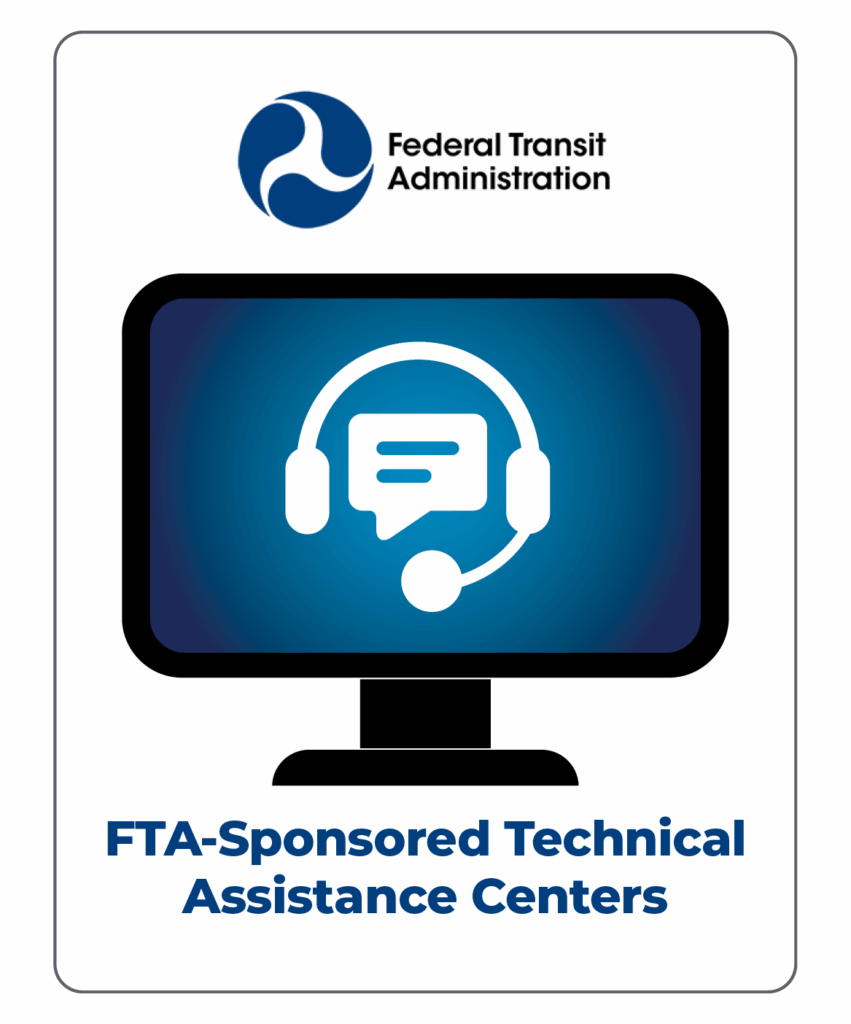
FTA-Sponsored Technical Assistance Centers
Federal Transit Administration
TOPICS: Apprenticeship , Career Pathways , Community Engagement , Hiring and Recruitment , Labor-Management Partnerships , Low-No , Mentorship , Policy and Planning , Procurement , Program Evaluation and ROI , Retention , Safety and Health , Trainer and Mentor Development , Training , Workforce Shortage
FTA’s Technical Assistance and Workforce Development Program (49 U.S.C. § 5314) and the Public Transportation Innovation Program (49 U.S.C. § 5312) fund technical assistance centers through national nonprofit organizations across a number of areas to improve public transportation. These nonprofit partners and the work they do play a critical role in supporting public transit agencies. Their services help to:
- Improve transportation for older adults and people with disabilities
- Drive the adoption of mobility management and related promising practices
- Accelerate innovative mobility practices and strategies
- Support rural communities
- Leverage new transit technologies
- Train the public transit workforce
- Provide workforce development technical assistance
- Support research projects chosen by the transit industry that address day to day issues
- Support the transit industry meet safety regulations
National Center for Applied Transit Technology (N-CATT)
The National Center for Applied Transit Technology (N-CATT) delivers expert, focused technical assistance to transit agencies and organizations in rural areas and small cities to use or develop transit technologies and innovations that make services more cost-effective and efficient. N-CATT’s work supports FTA’s mission and focus on innovation by developing and supporting transit programs and services in rural and small-city America.
National Aging and Disability Transportation Center (NADTC)
The National Aging and Disability Transportation Center (NADTC) is a national technical assistance center funded by FTA with guidance from the U.S. Department of Health and Human Services’ Administration for Community Living to promote the availability of transportation options that serve the needs of people with disabilities, seniors and caregivers with a focus on the Section 5310 program and other transit investments. NADTC supports the delivery of more effective, efficient, high-quality and coordinated specialized transportation services that maximize federal investments. NADTC provides technical assistance, information and referral; develops field training; implements interactive communication and outreach strategies; and supports communities in assessing their needs and developing innovative transportation solutions.
National Rural Transit Assistance Program (National RTAP)
The National Rural Transportation Assistance Program (RTAP) was established by FTA in 1987 to provide a wide range of professional services and products. National RTAP addresses the training and technical assistance needs of rural and tribal transit programs across the nation and supports state RTAP programs. National RTAP provides comprehensive free technical assistance programs and resources including training materials, webinars, newsletters and technical briefs, peer resources, research, and innovative technology initiatives. The National RTAP also manages the Transportation Technical Assistance Coordination Library (TACL), which provides a sustainable methodology and platform to access resources across a diverse range of transportation technical assistance centers and FTA.
Shared-Use Mobility Center (SUMC)
The Shared-Use Mobility Center is a public-interest organization dedicated to achieving equitable, affordable, and environmentally sound mobility across the US through the efficient sharing of transportation assets. By connecting the public and private sectors, piloting programs, conducting new research, and providing policy and technical expertise to cities and regions, SUMC seeks to extend the benefits of shared mobility for all. The Shared Mobility 2030 Action agenda includes improving access to public transit, on-demand shuttles or buses, ride-on-demand services, carpooling and vanpooling, and carsharing, bikesharing and scooter-sharing.
Coordinating Council on Access and Mobility (CCAM)
The strategic goal of CCAM, operated but the Community Transportation Association of America, is to support federal agencies, their grantees, partners, and stakeholders in improving transportation access for people with disabilities, older adults, and individuals of low income. CCAM promotes and facilitates human services transportation, public transit, and non-emergency medical transportation (NEMT) coordination that advances people’s access to everyday destinations.
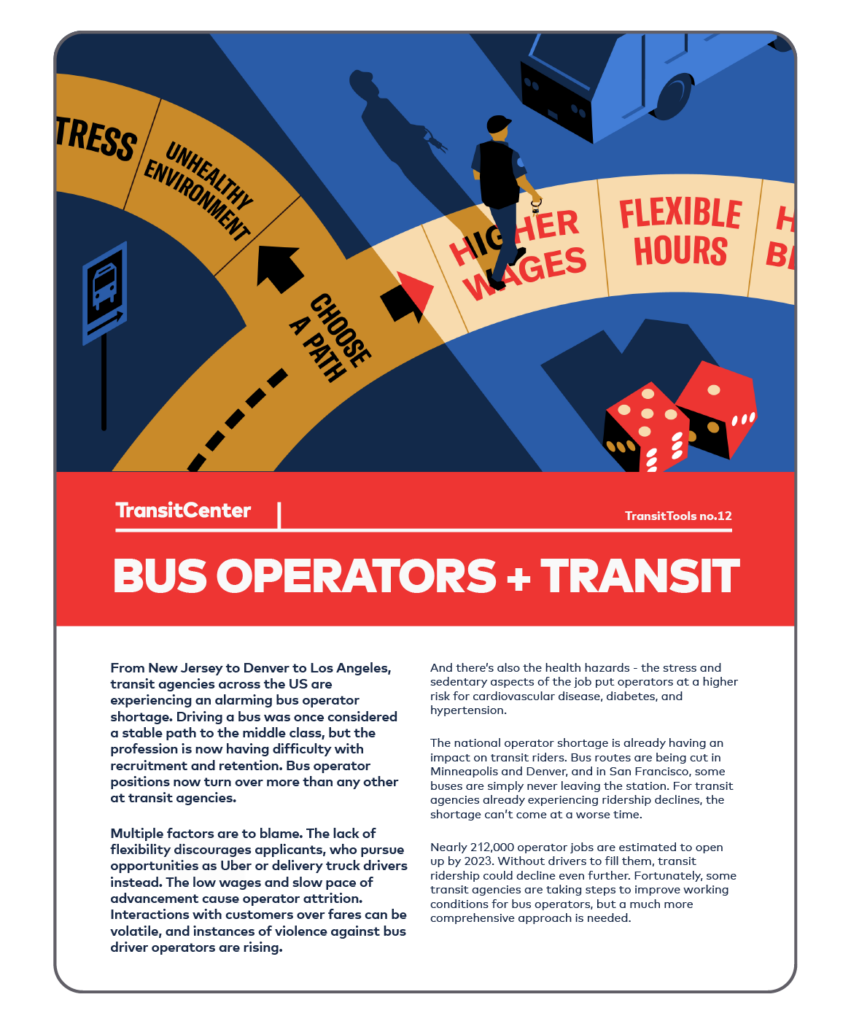
3 Ways to Make Bus Driving a Better Job
This report highlights ways that bus driving can be improved for workers to help increase retention and recruitment. The report explains three specific ways: redesigning the job for health and success, raising pay and creating opportunities for advancement, and making a more flexible schedule.
The National Campaign for Transit Justice
March 2024
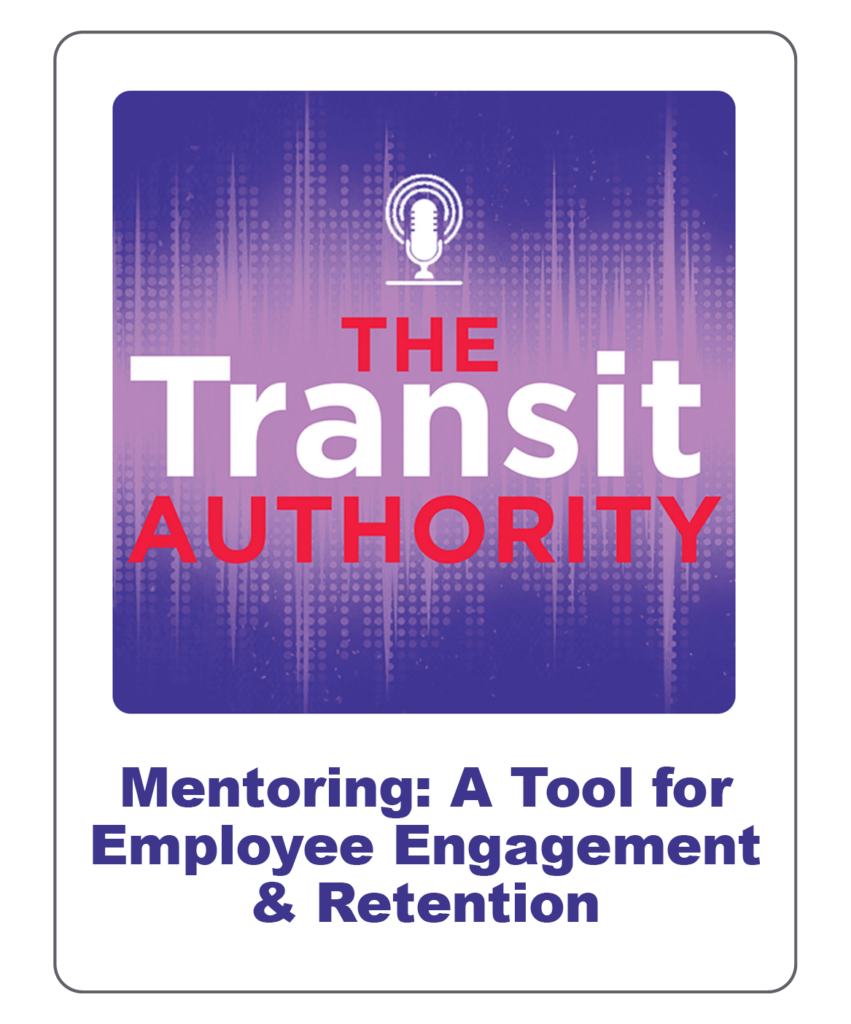
Mentoring: A Tool for Employee Engagement & Retention
APTA’s podcast, The Transit Authority, presents a two-part series on mentoring. The Santa Clara Valley Transportation Authority (VTA) and Greater Cleveland Regional Transit Authority (GCRTA) will discuss their partnerships with ATU to build and manage successful mentoring programs and how mentoring is a critical tool for knowledge transfer and positive work culture.
American Public Transportation Association
January 2024
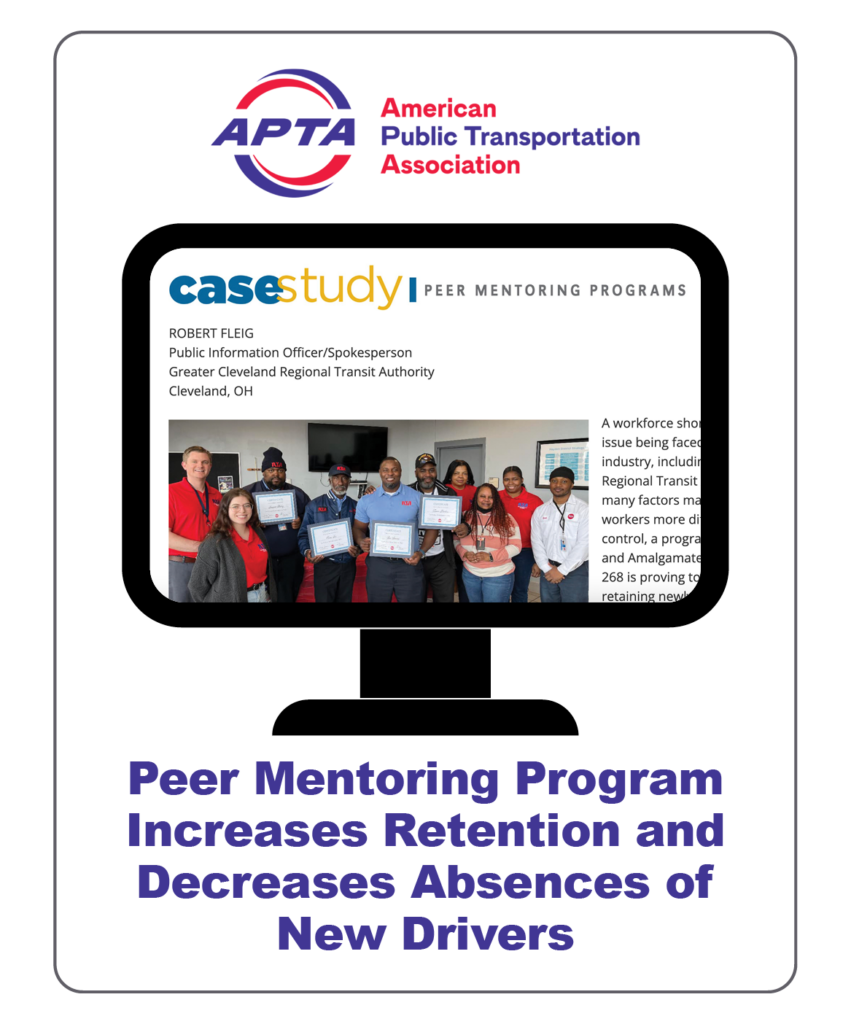
Peer Mentoring Program Increases Retention and Decreases Absences of New Drivers
This case study from APTA’s Passenger Transport presents findings from the mentorship program at Greater Cleveland Regional Transit Authority (GCRTA). GCRTA and ATU local 268 launched their Positive Impact Program, a peer mentoring program that has seen impacts on retention and absenteeism within its first nine months.
American Public Transportation Association
October 2023
TOPICS: Labor-Management Partnerships , Mentorship , Retention , Workforce Shortage
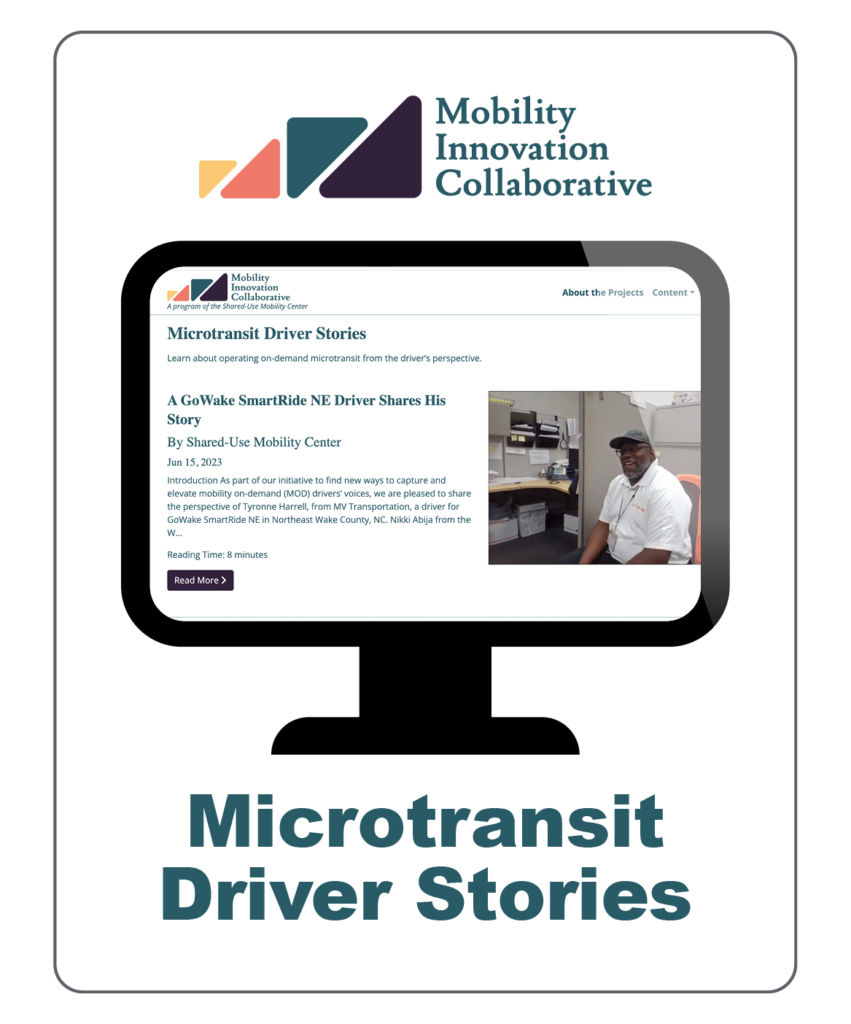
Microtransit Driver Stories
As part of the Mobility Innovation Collaborative, SUMC is sharing stories from mobility-on-demand drivers. These stories aim to capture and elevate perspectives from drivers across different transit agencies.
Shared-Use Mobility Center
TOPICS: Career Pathways
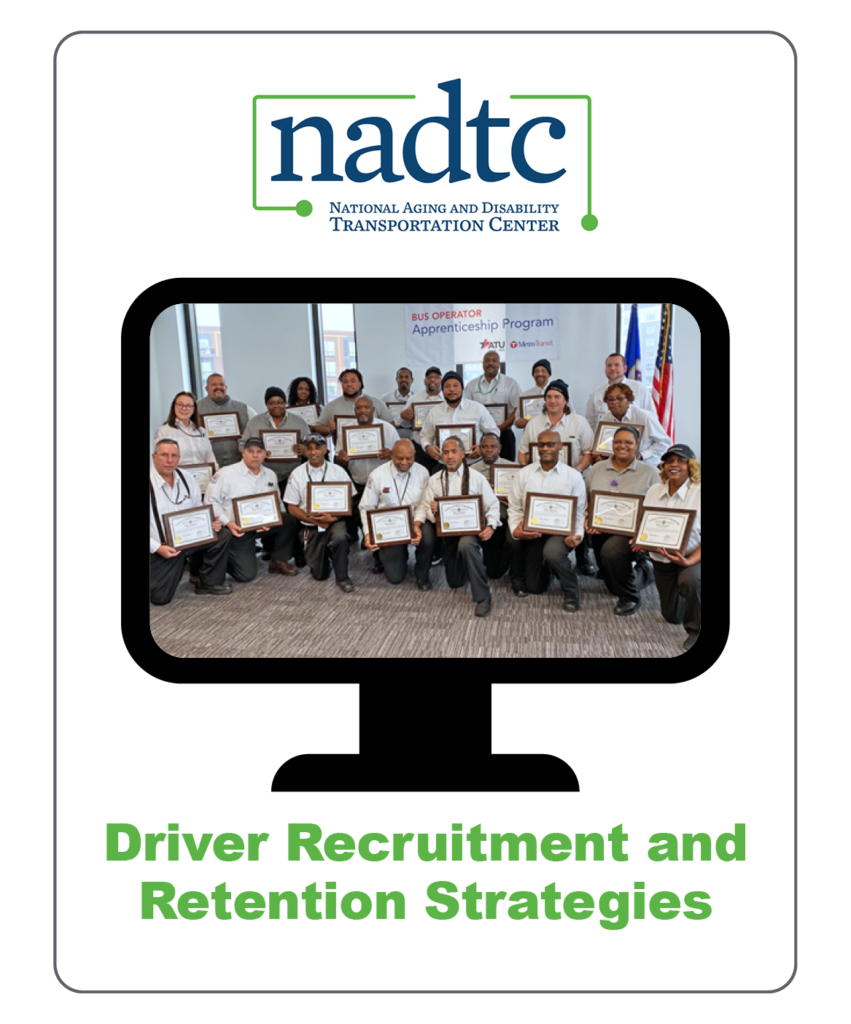
Driver Recruitment and Retention Strategies
This blog post from the National Aging and Disability Transportation Center discusses recruitment and retention strategies for transit agencies, particularly in regard to older and disabled workers in the face of industry-wide labor shortages. It includes examples of successful partnerships and effective mentoring programs.
National Aging and Disability Transportation Center
July 2023
TOPICS: Community Engagement , Hiring and Recruitment , Mentorship , Retention , Workforce Shortage
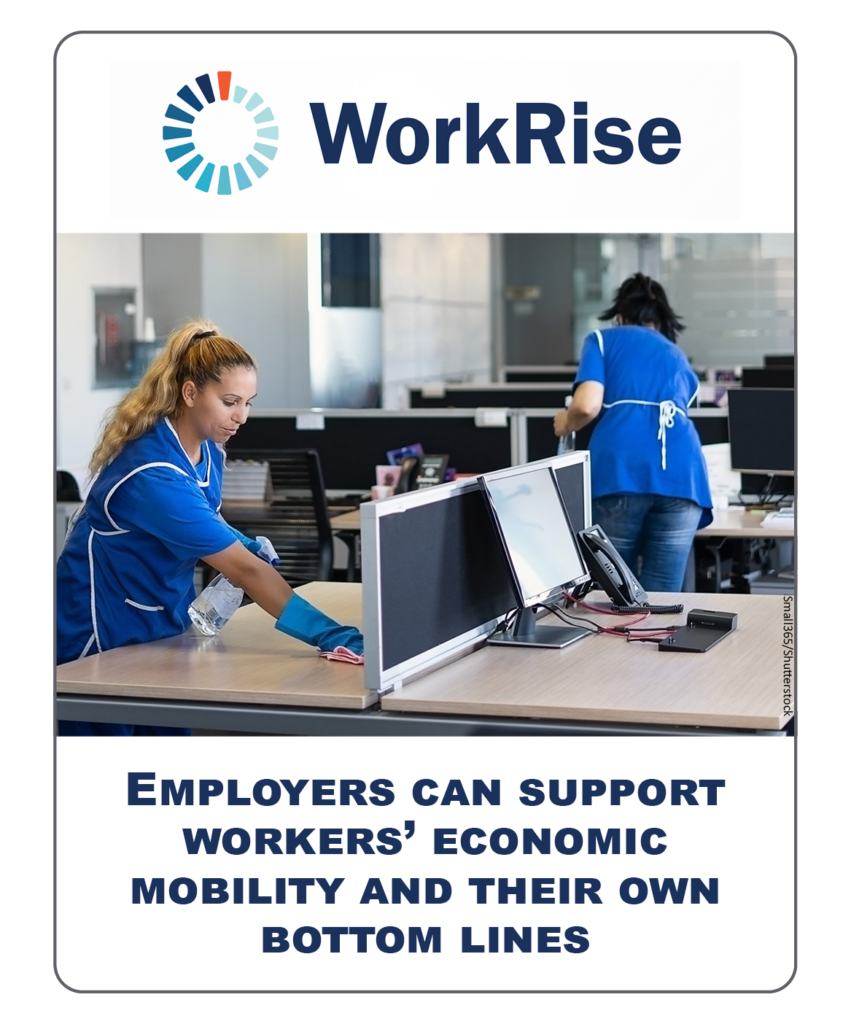
Employers can support workers’ economic mobility and their own bottom lines
This article provides a concise description of several strategies employers can use to create clear advancement pathways in their workplaces, which will help attract and retain quality candidates. It discusses research around what modern-day employees are looking for in a workplace and a position. It also links to a related article, which provides an overview of the framework created by Jobs for the Future (JFF) to describe the components of a good job.
WorkRise
November 2022
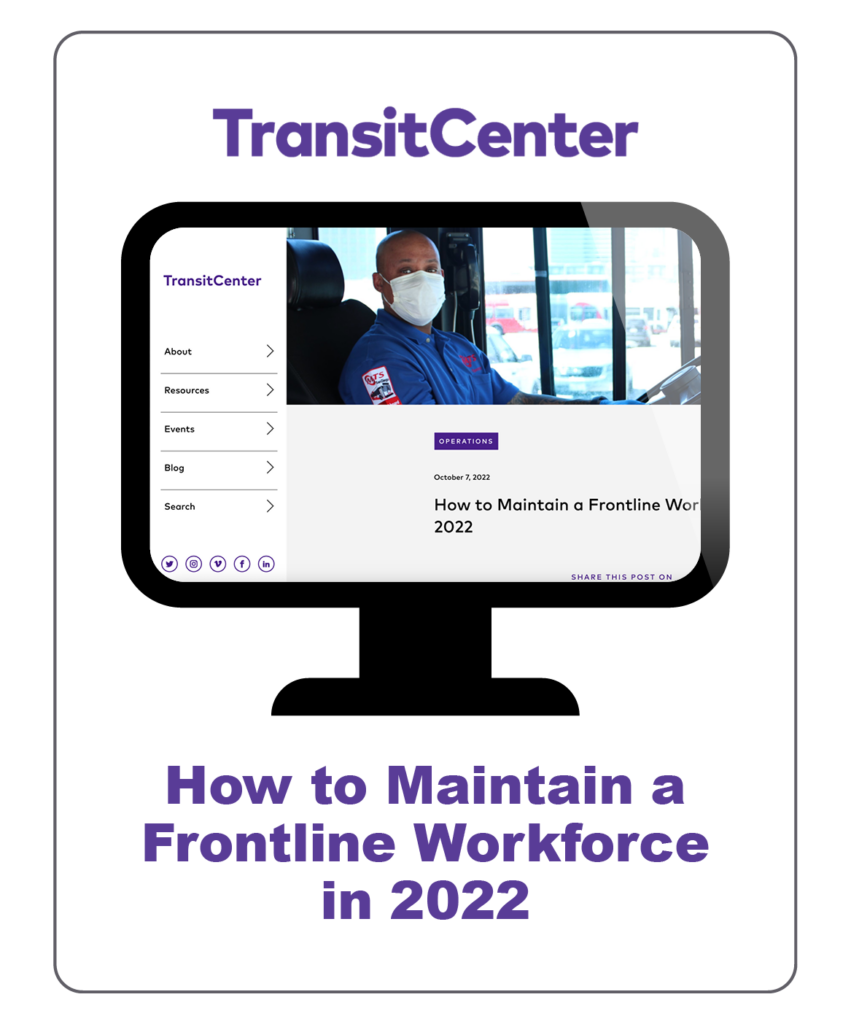
How to Maintain a Frontline Workforce in 2022
TransitCenter
October 2022
TOPICS: Hiring and Recruitment , Retention
This blog post considers steps taken by transit agencies in New York City and San Diego in order to bolster and maintain their frontline workforces in the aftermath of the pandemic and years of labor shortages in the transit industry. The post describes actions like increasing wages, easing CDL requirements, and increasing recruitment efforts.
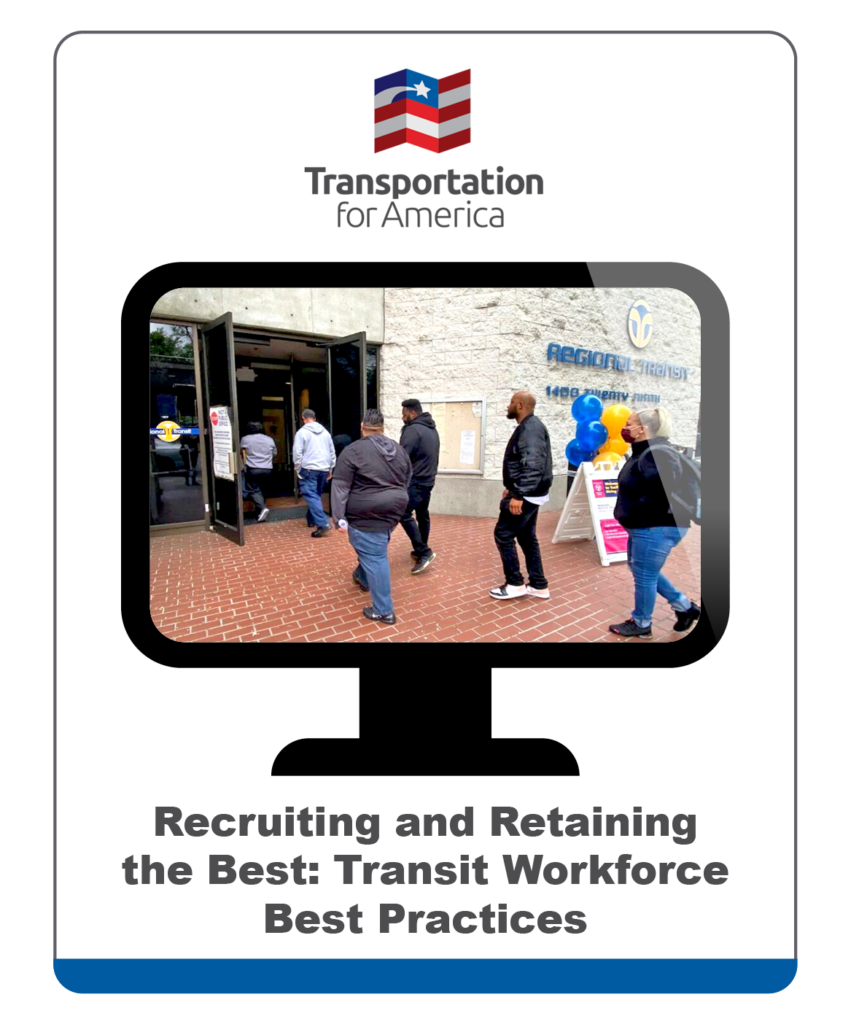
Recruiting and Retaining the Best: Transit Workforce Best Practices
This blog post from Transportation for America details successful strategies and best practices employed by transit agencies to empower their operator and maintenance workforces.
Transportation for America
September 2022

How to Improve EV Battery Performance in Cold Weather
This article provides advice and recommendations to transit agencies for maintaining electric vehicle battery performance in cold weather.
Government Fleet
July 2022
TOPICS: Low-No
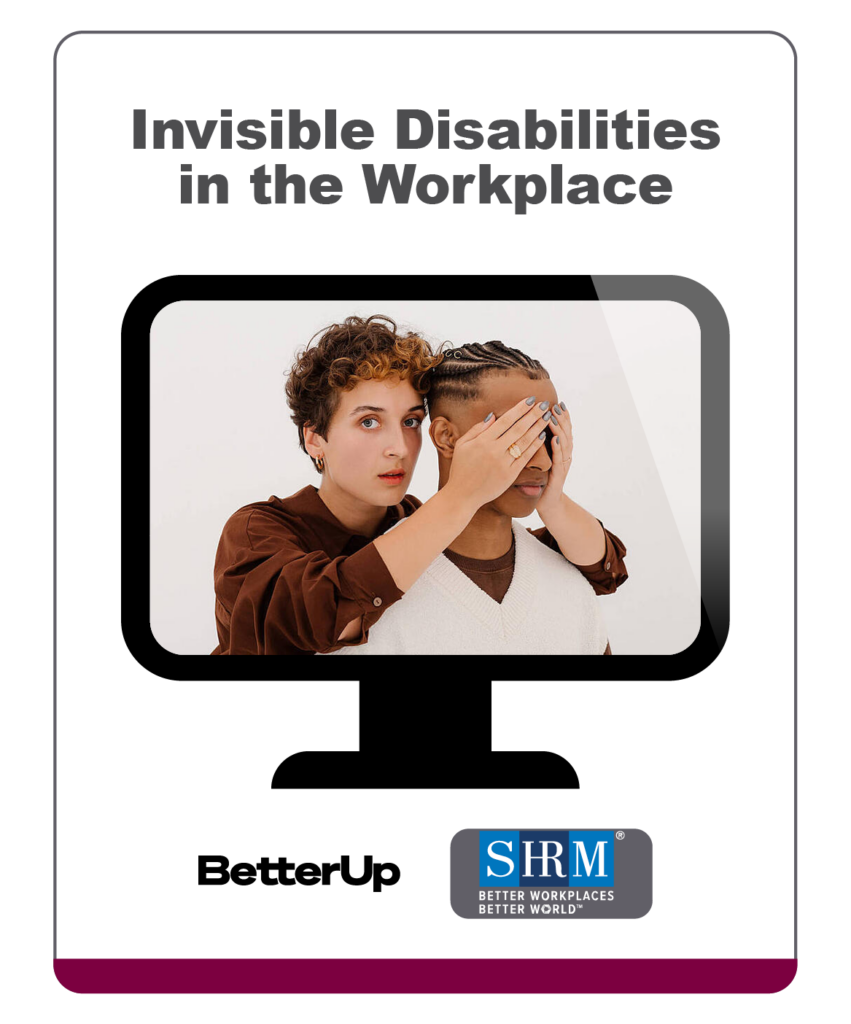
Invisible Disabilities in the Workplace
These two resources provide insight for employers into what “invisible” or “hidden” disabilities are, how to provide opportunities for employees to voluntarily disclose them, and how to support individuals with such disabilities to be successful in the workplace.
BetterUp; SHRM
February 2022
TOPICS: Community Engagement , Hiring and Recruitment , Retention
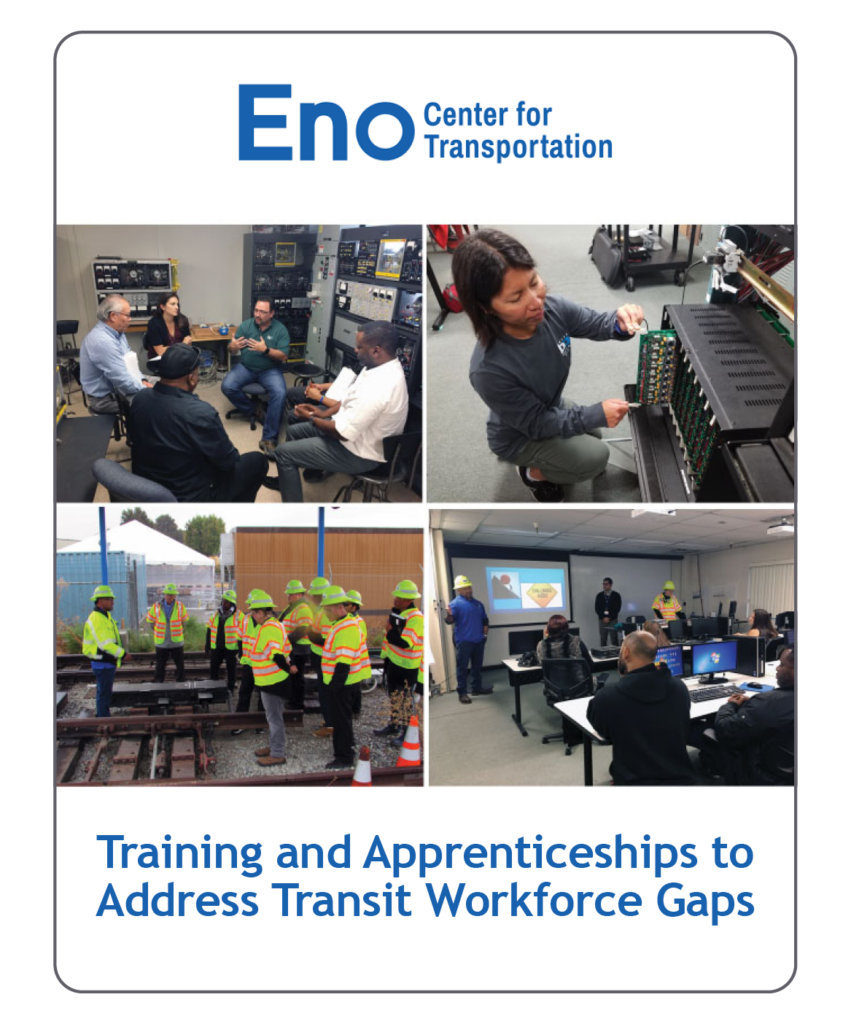
Training and Apprenticeships to Address Transit Workforce Gaps
This piece, penned by Jack Clark of the International Transportation Learning Center (ITLC), explores the role of training and apprenticeship programs in meeting workforce needs in transit, with a focus on operators. It discusses a few leading examples of apprenticeship programs in transit, as well as the role of mentorship in a strong apprenticeship program.
Eno Center for Transporation
August 2019
TOPICS: Apprenticeship , Career Pathways , Mentorship , Training
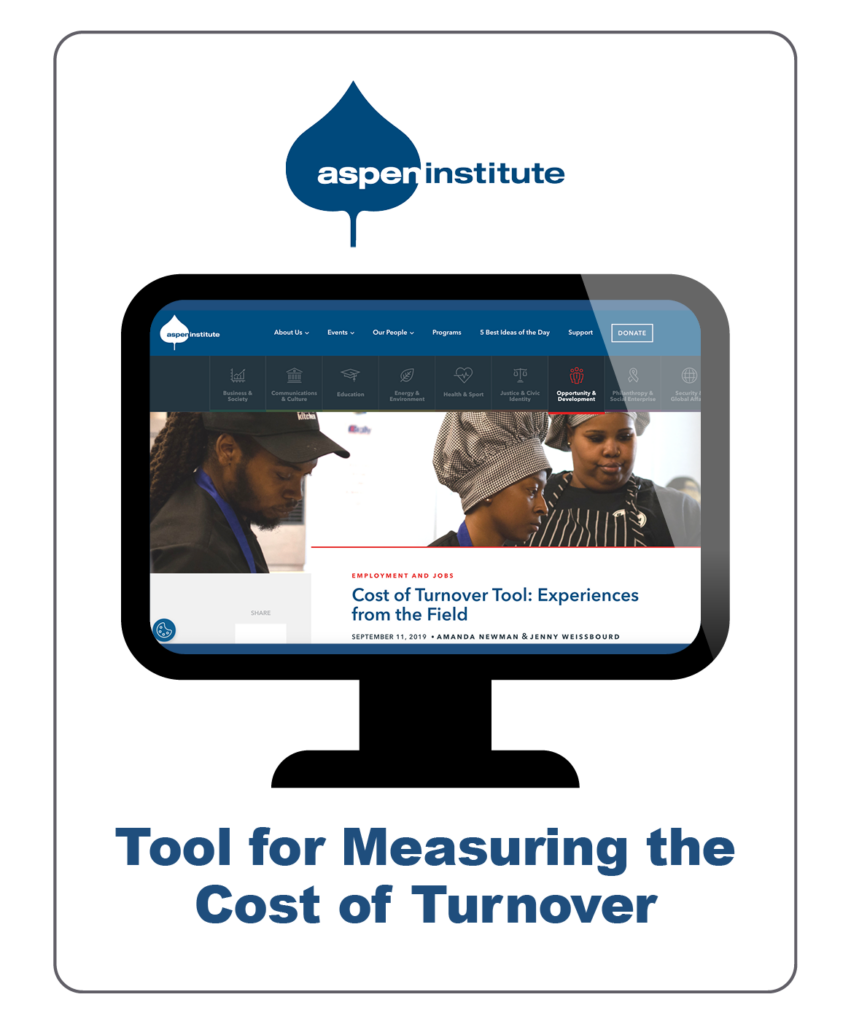
Tool for Measuring the Cost of Turnover
This Cost of Turnover Tool is a simple, “back of the envelope” calculator to help estimate how much it costs to replace staff. The tool can be useful for transit agencies looking to understand the costs of a low retention rate, or those looking to calculate the return-on-investment of mentoring or apprenticeship programs.
Aspen Institute
March 2019
TOPICS: Apprenticeship , Mentorship , Policy and Planning , Program Evaluation and ROI , Retention
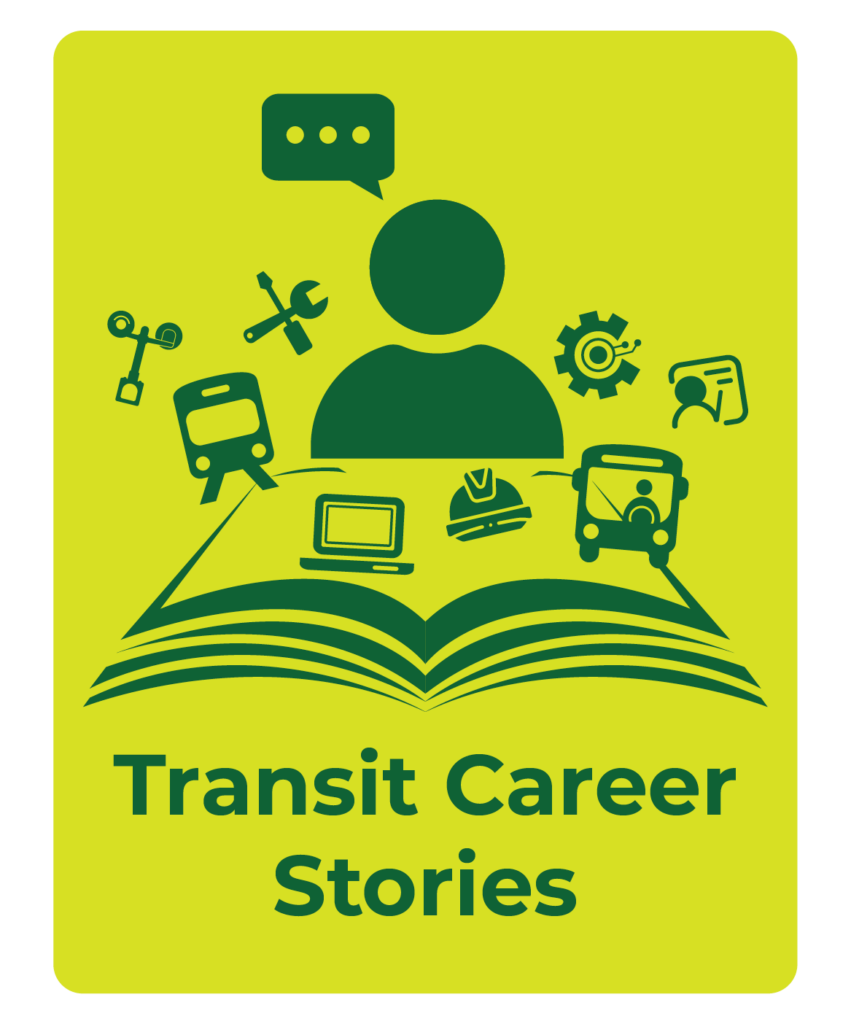
Transit Career Stories
Transit Workforce Center
TOPICS: Career Pathways , Community Engagement , Mentorship
These Transit Career Stories showcase workers’ journeys and career pathways to help increase awareness of transit careers. Learn from these professionals and community leaders through their own telling of what they do, how they got there, and what makes their work exciting and rewarding.







